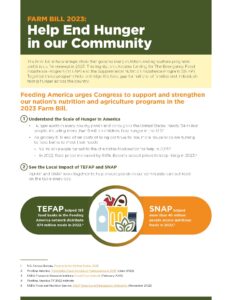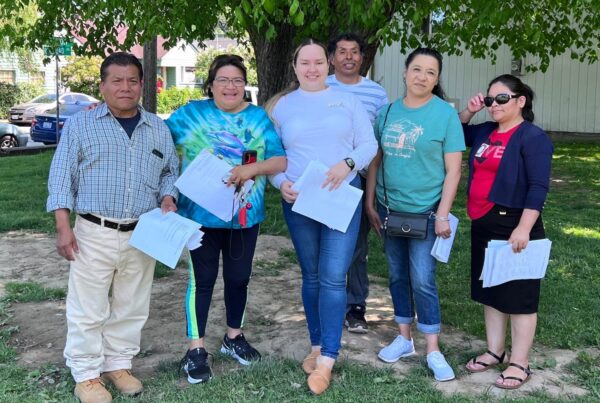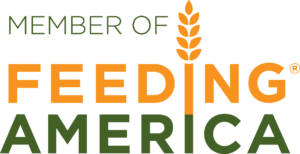
By Aaron Czyzewski
Director of Advocacy & Public Policy
So, what’s really at stake? Renewed every five years, the 2023 Farm Bill is critical to hunger relief in that it funds policies and programs across the entire food system from agricultural production to food and nutrition assistance (like SNAP). Food Lifeline is urging lawmakers to strengthen their commitment, with this farm bill, to ensuring that people all across Washington have access to nutritious foods and that Washington farmers have policies and programs that help them provide it.
Food Lifeline’s farm bill advocacy centers around two main priorities:
1) Double funding for The Emergency Food Assistance Program to $500 million and allow more purchases from local farmers—TEFAP provides federal food commodities to states from agricultural farmers and producers to augment food that is donated. Food Lifeline is sending more food to local communities than before and even during the pandemic, so increasing TEFAP is essential to keeping inventory levels up, while also supporting our local farm economy, our communities, and those facing hunger.
2) Protecting SNAP – In Washington state, over 874,000 individuals rely on monthly SNAP benefits to supplement their grocery spending and feed themselves and their families healthier food options. Food Lifeline supports the protection and expansion of these benefits to cover seniors, college students and immigrants who many not qualify due to edibility requirements.
Hunger Action Month (September) is the best time for farm bill advocacy, and everyone is needed to voice these priorities to Washington’s congressional delegation. For more information on how you can help advocate for an effective farm bill, please reach out to Food Lifeline’s advocacy team. Details on Feeding America’s farm bill priorities are here.
Click here to learn more about how the farm bill helps with hunger:
How Do These Priorities Make It Into the Farm Bill?
They have been formalized in a bill titled the “Farmers Feeding America Act of 2023,” S.2713, by Senator Bob Casey of Pennsylvania. The purpose of this “marker bill” is to give the congressional Agriculture Committees language that they can consider adding to the farm bill as it’s developed.
The bill contains language that provides $500 million in additional funding for TEFAP entitlement commodities for each fiscal year 2024 through 2028. This funding will continue in 2029 and beyond, adjusted by the percentage by which the Thrifty Food Plan is adjusted for inflation.
It also continues to provide base entitlement commodity funding for each fiscal year 2024 through 2028, adjusted by the percentage by which the Thrifty Food Plan is adjusted for inflation. In FY 2023, base funding amounted to $445.5 million.
Emergency Food Program Storage and Distribution
The bill has a section that adjusts the current statute to allow up to $200 million to be appropriated by Congress for TEFAP storage and distribution, an increase from $100 million. This funding remains subject to the annual appropriations process. This is important because it is the nation’s charitable hunger relief system that takes and distributes these commodities throughout the U.S. Not a small feat and one that incurs costs just like any other business operation. Historically, food banks have only been partially supported for the costs associated with TEFAP food storage and distribution.
Emergency Food Program Infrastructure Grants
The bill adds a section that extends the authorization of $15 million to be appropriated to carry out TEFAP Rural Infrastructure Grant Program for each fiscal year through 2028. The current statute ends in 2023. This funding remains subject to the annual appropriations process.
Additional Provisions Related to Allotment and Delivery of Commodities
This section of the bill adds to existing statutes to:
Establish alternative delivery options for commodities allocated to “geographically isolated states” to ensure they can receive commodities, and to allow them to order commodities through the Department of Defense Fresh Fruit and Vegetable Program. It names Hawaii, Alaska, Puerto Rico, the Northern Mariana Islands, Guam, and the U.S. Virgin Islands as geographically isolated states.
Provide the secretary of agriculture with additional authority to transfer to a geographically isolated state the cash value of up to 20% of the commodities allocated to that state. Those funds could then be used to directly procure domestically grown food in lieu of receipt of those commodities.
Allow the secretary to consider additional factors beyond the lowest price in determining winning bids for contracts for fresh produce packages, including product variety and transportation distance.
EAT Healthy Foods from Local Farmers Act
Another important farm bill marker bill is the EAT Healthy Foods from Local Farmers Act, H.R.4185 by Representative Kim Schrier, MD, of Washington.
This marker bill seeks to improve TEFAP and put more emphasis on procuring produce from local farmers. “Representative Schrier is a champion for food security by continuing to reflect and raise the voices of small-scale farmers and hunger relief organizations across Washington. Her introduction of the EAT Healthy Foods from Local Farmers Act directly impacts and strengthens regional agricultural systems while reducing food insecurity in our communities. Food Lifeline is proud to support Rep. Schrier. We are eager to be a part of the collaborative relationship to distribute fresh, nutritious, and culturally relevant foods from local farmers throughout our food agency network,” says Food Lifeline CEO Linda Nageotte. “Representative Schrier’s bill is easy to understand. It uplifts local farmers, local food, feeding local families. It’s the kind of solution we need, and Food Lifeline is proud to bring Washington grown food to people and families we serve.”
STORE Act of 2023
And there is the “Supporting Transportation Organization and Refrigeration Expansion Act of 2023” or STORE Act of 2023, H.R.5136 by Representative Susan Bonamici of Oregon and Representative Kim Schrier, MD, of Washington.
“This bill compliments TEFAP by funding refrigeration and transportation of fresh and frozen foods. If enacted, this bill will be a huge win for our communities’ battle against food insecurity and a win for our farmers,” said Congresswoman Kim Schrier, MD “This bill works in tandem with The Expanding Access to (EAT) Healthy Foods from Local Farmers Act we introduced earlier this year.”
The legislation is supported by Feeding America. “The Emergency Food Assistance Program, or TEFAP, moves nutritious food from U.S. farms to local food banks to families facing hunger,” said Vince Hall, Chief Government Relations Officer at Feeding America. “But food banks are often left to fill the gap in funding for the hefty costs of storing and distributing these foods. In fiscal year 2022, the funds provided by Congress covered, on average, only 34% of the total projected cost for Feeding America food banks to store and distribute TEFAP foods. The STORE Act, introduced by Reps. Bonamici and Schrier, would help food banks offset the rising costs of refrigeration and fuel to distribute food throughout their local communities, especially rural and under-resourced communities. Strengthening TEFAP is a win-win for people experiencing food insecurity, food banks and farmers. We urge Congress to help ensure food banks have the infrastructure and resources they need by including this important legislation in the final 2023 Farm Bill.”







